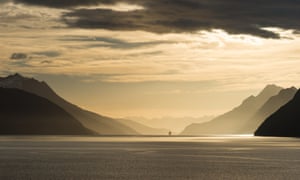A growing wave of resistance to the expansion of salmon farms along the Chilean coast has led to an important victory in the fight to protect a pristine fjord in southern Patagonia, home to indigenous groups and an array of stunning wildlife.
Dolphins, whales and colonies of penguins thrive in the 240km-long Beagle Channel, an area of outstanding natural beauty between Chile and Argentinawhich attracts tourists from all over the world.
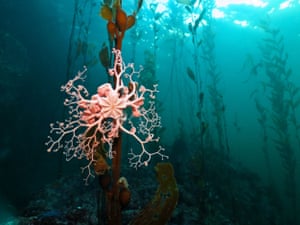
Business interests, from both home and abroad, have faced fierce opposition from scientists and campaigners, who claim the introduction of the non-native species will replicate damage caused by the aquaculture industry elsewhere in the region.
The local community and campaigners are celebrating an unprecedented triumph after putting a stop to one company’s plans to rear 1.9m fish in 18 cages in what would be the first salmon farms in the Beagle Channel.
Earlier this year Greenpeace alleged that the company Nova Austral had illegally installed a number of sea pens on the water near Puerto Williams, the world’s southernmost city.
“We learned the company had a legal restriction [on operating] in that area,” Estefanía González, Greenpeace’s ocean coordinator in Chile, told the Guardian.
Three days before the Chilean-owned firm introduced baby salmon to the enclosures it was ordered, on 18 April, to cease operations pending further investigation. This followed an appeal lodged to a court by Greenpeace and the residents of Puerto Williams.
Greenpeace claimed satellite photographs taken between January and February this year showed the transfer of materials to establish the cages at sea at a time when such activity would have been prohibited.
Nova Austral, which prides itself on rearing salmon without the use of antibiotics, denied any illegal activity and said it did not acquire the fishing concessions from another company until February.
The company told the Guardian it would have been “impossible to initiate operations or constructions prior to that date” as they did not yet own the permits.
The Court of Appeal in Punta Arenas ruled 3-0 in the company’s favour. The court case concerned whether the cages were installed legally, but González explained that separately the fishing authority confirmed that Nova Austral’s permits had already expired. “So in any case they did not have a valid licence to operate in the Beagle Channel.”
In June Nova Austral told the Guardian it intended to defend the validity of the licences but on 11 August a photograph allegedly showing a ship transporting the cages away from the site appeared on social media.
One campaigner wrote on Facebook: “For the first time in Chile’s history, a local community gets justice and forces a multinational salmon farm company to dismantle its illegal and polluting facilities and to leave Beagle Channel waters. Ciao Nova Austral.”
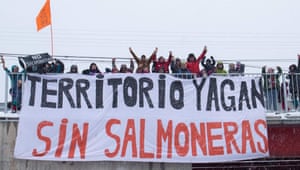
The company, which is one of five big seafood producers working in the region, owning 32 out of 130 concessions, confirmed to the Guardian that it had began withdrawing all operations from the Beagle Channel.
A company spokesman said: “In accordance with normal procedures, we are retrieving the pens from the concession area. This will not have an impact on the company’s ability to preserve its legal rights in the zone.”
González said the victory highlighted a lack of proper regulation and could lead to a wider shakeup of the industry in Chile, the second biggest producer of farmed salmon worldwide after Norway.
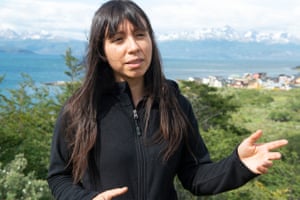
“This is a watershed moment for us because it could open the door to review all the other concessions in Patagonia.”
She added: “The authorities could have checked these licences many years ago. The only reason they are responding now is because of the huge social pressure which has been building in Chile – in Santiago, in Puerto Arenas, in Puerto Williams.”
David Alday Chiguay is a descendant and representative of the Yaghan indigenous community, living in Caleta Mejillones near Puerto Williams.
He said the start of the withdrawal of the Nova Austral marine structures marked a historic day for the Yaghan people. The community has lived on the remote southern tip of South America for an estimated 10,000 years, and has strongly opposed the salmon farms.
In Villa Ukika, a town created by the Yaghan on the outskirts of Puerto Williams, a festive celebration was held on the day Nova Austral began the removal of its operations.
Chiguay said: “It is a big deal to us to have stopped this because the government is normally on the side of the salmon industry.”
Oceans campaigner for Greenpeace Mauricio Ceballos said part of the problem was a system that allowed smaller companies to buy concessions and later sell them to bigger investors with the financial means to implement the farms.
He said: “The Chilean state has made the huge mistake of delivering aquaculture concessions indiscriminately … without any control and generating huge damage to the environment and local communities.”
The withdrawal of operations by Nova Austral in the Beagle Channel is a further blow to the company after it was involved in a data-rigging scandal in June.
The company’s CEO, Nicos Nicolaides, was forced to step aside after it was alleged that Nova Austral had misrepresented its fish mortality figures to regulators. The scandal has led to calls for stricter regulation of the industry.
The practice of rearing Atlantic salmon has been established in Chile for three decades and more than 1,000 farms currently operate throughout the country, producing 25% of the world’s supply.
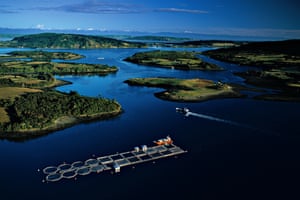
Salmon farming is the country’s second largest export sector after mining, generating 61,000 jobs. Chile caters for more than 100 international markets with the bulk of exports going to China, Brazil, Russia, Japan and the United States. It is predicted that by 2030, it will have increased its aquaculture fishing exports by 56%.
But authorities in some provinces are pushing back on the expansion of the industry due to the pollution it causes.
Salmon farmed in Chile are pumped with 500–700 times the amount of antibiotics compared with salmon produced in Norway by the same companies, claims Greenpeace, while huge amounts of waste in the form of faeces and uneaten food pellets end up on the seabed. In addition there are additional pressures on marine life posed by outbreaks of sea lice and farmed fish escaping into the wild.
When the king and queen of Norway visited the Chilean town of Punta Arenas during a state visit earlier this year they were met with a series of demonstrations against the expansion of Norwegian-owned salmon farms in the Magallanes region.
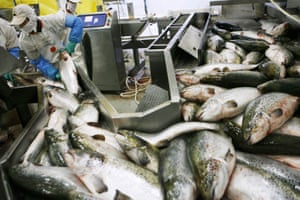
Leticia Caro is a paramedic and member of the Kawésqar community living in Punta Arenas where the landscape unfolds between fjords and channels that house forests, glaciers, rivers, lagoons and mountain ranges.
“It is special because of its biodiversity, which has hosted the nomadic southern canoeists for thousands of years,” she said.
Caro, whose family is dedicated to artisan fishing, said salmon fishing was a destructive industry. “The expansion of salmon farming in Magallanes will mean the sure death of our seas.”
She said that Chile already had the example of Chiloé, where marine mammals, birds and fish were killed “in apocalyptic quantities” in May 2016 on the coastal edges of the Chiloé archipelago. Greenpeace and many locals ascribe the deaths to pollution; the government and local fishing companies dispute this.
More than 60 Norwegian companies are already established in Chile, and the royal visit to Magallanes signalled fresh opportunities, with 70 representatives from Norwegian businesses on the state tour.
On the other side of the Beagle Channel, in Argentina, residents and environmentalists have been making gains in their own battle to prevent the introduction of the country’s first salmon farms on their side of the fjord.
A social movement objecting to salmon farming has been growing since a deal was signed with Norway in 2018 to conduct research into the suitability for salmon farms in the coastal areas of the self-governed province of Tierra del Fuego, including the Beagle Channel.
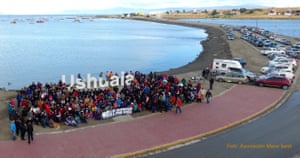
The findings of a year-long fact-find were due to be published earlier this year following an agreement signed between the government of Argentina, along with the local authorities, and the government agency Innovation Norway, but the report is yet to be made public.
Scientists and indigenous groups in and around Ushuaia who raised objections were met with a wall of silence until earlier this year when a provincial government spokesperson declared for the first time that salmon farms on the Argentinian coast were “not on the government’s agenda”.
Marine biologist Gustavo Lovrich, who has carried out scientific research in the area since the 1980s, is among those belonging to a civil movement that has been highlighting the negative impact of salmon farming.
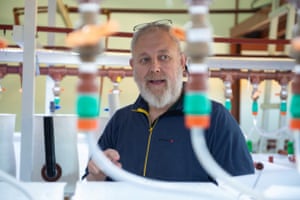
He said: “Sea mammals and sea birds get tangled in the nets, and the employees of these types of farms kill seals that try to get into the cages to eat the fish.
“This is a concern because we have many colonies of fur seals that attract tourists. Introducing salmon farms here would decimate the seal population.”
Marcello Lietti, who works for the Chamber of Tourism in Ushuaia, said any activities that negatively affect the region’s rich biodiversity would impact directly on a tourist industry that contributes $74m (£60m) a year to the local economy.
“The Beagle Channel is our second biggest tourist attraction after the Tierra del Fuego national park, and 16,800 Fuegians rely on tourism in the region for their livelihood,” he said.
They include Lino Adillon, who has run a seafood restaurant in Ushuaia called Volver since 1988. In the last year the chef decided to suspend the sale of salmon to protect other seafood such as the king crab, a signature dish and local delicacy popular with tourists.
“Out of respect for the Beagle Channel and its marine life, upon which my restaurant relies, I took salmon off the menu,” Adillon explained. “It is unethical to sell this produce, even though it was profitable. I am spreading the word about how bad it is to farm this species, bred in overcrowded cages with huge amounts of antibiotics.”
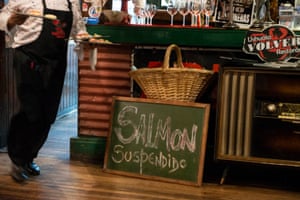
When customers are brought the bill they are also given a flyer explaining the negative impact of salmon farming, said Adillon.
“To obtain a kilo of salmon, five kilos of other fish were sacrificed to feed them in the form of pellets. The planet will eventually run out of those types of fish being caught to feed salmon,” he said.
The 1:5 “fish in, fish out” ratio for salmon has been disputed by some in the fishing industry.
Lovrich told the Guardian the local community is now pushing for legislation to ban salmon farming in the region. He said while more transparency was needed around the issue, he welcomed a recent political shift that has seen increased support in opposition to salmon farms.
The current governor of Tierra del Feugo has not spoken out on the issue but will be stepping down at the end of the year after losing out in elections held in June.
Lovrich explained: “We are hoping for a provincial ban on salmon farming when the new governor takes up their post in December. The new vice governor has previously drafted a bill supporting a ban so we are hopeful this can happen.”
Asked about the strong opposition to salmon farming in the Beagle Channel, Innovation Norway said: “It is up to Argentina to decide whether there will be salmon farming in Patagonia.
“There are negative environmental effects of all food production. Our approach is to contribute to salmon farming being conducted in a sustainable manner. This means it must be research-based, carefully managed and strictly controlled.”
Meanwhile a source from Nova Austral said the company would not rule out applying for a permit to farm salmon on the Beagle Channel in the future.
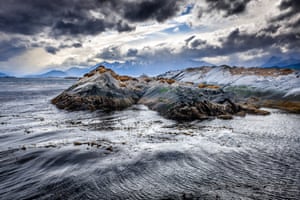
For local communities and members of Patagonia’s indigenous groups, the threat from salmon farming is ever-present.
“It is time to unite forces among those who inhabit the territories and strengthen the Argentine-Chilean brotherhood to preserve these pristine waters where life persists,” said Caro.
Their voices are supported by a growing body of scientific evidence stacked against the interest of the aquaculture industry.
Following the publication of a report by the Forum for the Conservation of the Patagonia Sea last year, its president, Claudio Campagna, gave a stark warning.
“Based on the abundant scientific and technical information available, the farming of an introduced species in an ecosystem as rich and fragile as the Patagonian sea would represent a historical error that we will regret forever.”



